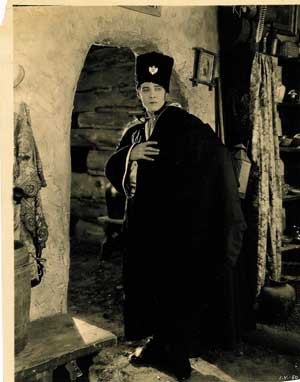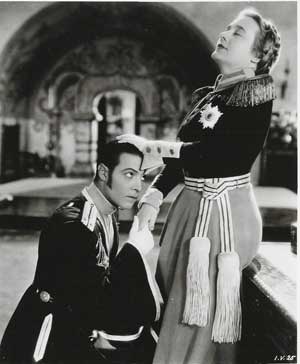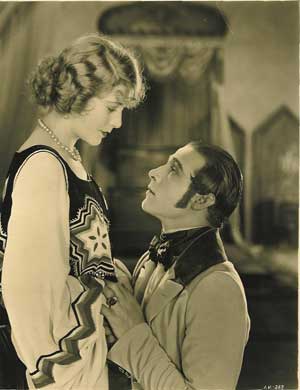THE
EAGLE
|
Review of ""The Eagle"" (1925)
By Wm. Charles Morrow
Billy Rose Theatre Division
New York Public Library for the Performing Arts
I rarely see this
title mentioned on lists of great silent
films, and perhaps it doesn't belong in the same heady company with
the works of Murnau and Eisenstein, but surely "The Eagle" belongs
on
anyone's list of the most entertaining movies made during the silent
era. It is first-rate escapism, a real "movie-movie" that can hold
its own with the best swashbuckling sagas of Douglas Fairbanks and
Errol Flynn, and that counts for a lot in my book. It's also one of
the best movies Rudolph Valentino appeared in (along with his next
film, "The Son of the Sheik," which unfortunately proved to be his last),
or in any case it's one that holds up well for modern viewers,
offering just the right blend of action, suspense, comedy, and
romance, all presented at a brisk tempo. Valentino rapidly improved
as an actor during his brief career, so that in these last
appearances there is no trace of the nostril-flaring histrionics on
display in some of his early performances. At the pinnacle of his
career as a movie star, Valentino is at the top of his game in this
action hero role, charismatic and self-assured, but displaying just a
touch of self-mockery to keep things in perspective.
|
Rudy plays a Cossack officer, Lieutenant
Dubrovsky, stationed in the court of Catherine the Great. (The
Czarina is played by Louise Dresser in
a brief but memorable turn.) Dubrovsky catches the
Czarina's eye when he manages to regain control of a runaway carriage
just outside the palace gates, and in this way he also meets a
beautiful young lady named Mascha (Vilma Banky), with whom he becomes involved.
The plot kicks into gear when Dubrovsky rejects the
Czarina's advances and soon afterward assumes the persona of the
Black Eagle, an outlaw devoted to avenging his father, whose lands
have been appropriated by an evil count named Kyrilla-- who just
happens to be Mascha's father. Valentino's character in this film is
often described as a "Russian Robin Hood" but the parallel with Zorro
is stronger, especially when he manages to operate under the very
nose of his arch enemy in the guise of a foppish French tutor,
Monsieur Le Blanc. Much of the film's humor comes from these scenes,
but when the time comes for action The Black Eagle is all business,
and Valentino proves himself as dashing and gallant as Douglas
Fairbanks while cutting a more romantic figure.
|
 |
"The Eagle" points up
the importance of silence in Valentino's
career, for while he was said to have a pleasant voice there's no way
audiences could have accepted him as a Russian officer in a talkie;
let's face it, Rodolfo Alfonzo Raffaele Pierre Filibert Guglielmi di
Valentino d'Antonguolla would have a hard time persuading anyone of
his Russian heritage if we could hear him speak. Leading lady Vilma
Banky, who was as beautiful as Rudy was handsome, spoke limited
English with such a thick Hungarian accent that talkies ended her
American film career, so a version of this movie with full sound
could never have been made with the same cast, even if Valentino had
survived into the '30s. Then again, the highly stylized 19th century
"Russia" of this film is very much a Hollywood fantasy concoction
anyhow, and the sort of thing that worked best in silent cinema. One
of my favorite aspects of "The Eagle" is the elaborate Art Deco
design scheme by William Cameron Menzies, which at times almost
suggests the world of Dr. Seuss (a bit of an exaggeration, perhaps,
but not by much). Combine Menzies' sets with the stylish
cinematography of George Barnes, spice the mix with George Marion
Jr.'s witty title cards, top it off with the slyly tongue-in-cheek
performances, and you have all the ingredients for a cinematic feast.
|
 |
In sum, I feel it's the comic elements
of "The Eagle" that
make it such a winning film, the sense that the filmmakers
are discreetly giving us a little wink to let us know they're well
aware this is all
cotton candy. And speaking of comedy, the cast features a couple of Keystone
veterans in supporting roles: Mack Swain, who was so
memorable as the delusional prospector in Chaplin's The Gold Rush
has a brief unbilled bit as an inn-keeper who misunderstands Monsieur
Le Blanc's needs; and veteran character actor George Nichols, who plays
the corrupt judge, also directed a few of Chaplin's earliest
comedies, including The Star Boarder and Cruel, Cruel Love. Maybe
it's the Keystone pedigree that boosts the comedy content here, but
whatever the case this film stands as a highly enjoyable example of
what Hollywood craftsmen were capable of when the silent cinema was in
its prime.
(Reprinted with permission)
|
|
|













